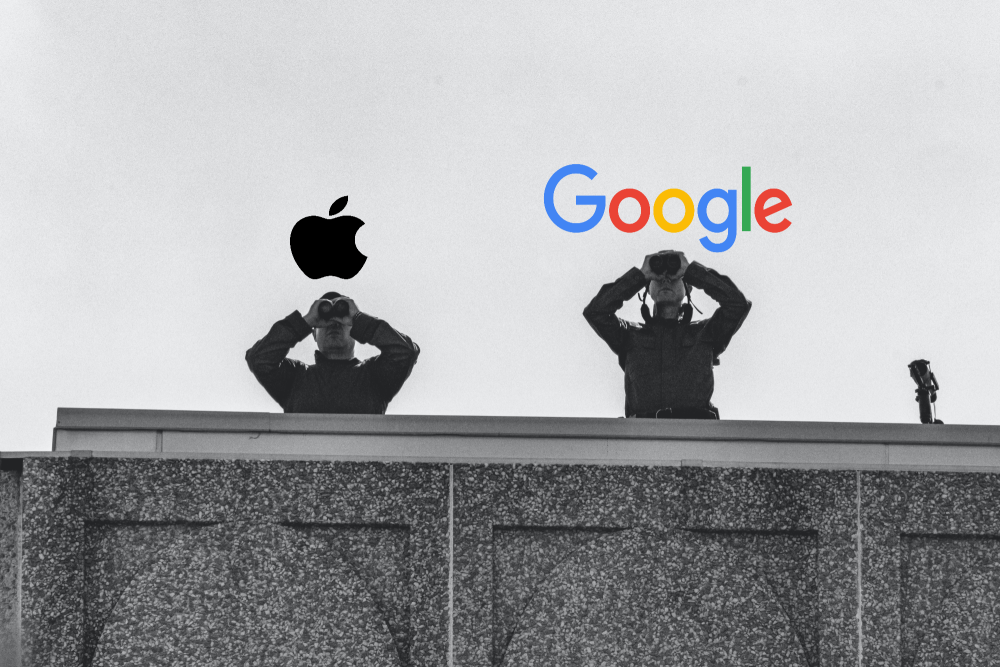Your own personalised stalker
It always seemed slightly creepy that your computer shows advertising that is strangely accurately targeted at things you might have been interested in. On the surface, that seems quite useful. If you have to tolerate ads on your screen, at least having them show things you were interested in seems helpful.
Instead, we wonder how the system knows. It feels like a breach of our privacy.
It all starts when you install an app, and it pops up a question asking for permission to use your location, and/or your camera and/or your microphone.
This is useful for advertisers. For example, they can use your location. If the app reports this back to the content provider, they can match up your location and compare you to other people nearby. If you tend to go to the same places as other people, you are probably interested in the same things, so an advertiser might use that assumption to present advertising to you, or other people that you spend time with.
That does sound a bit overreaching, but we reluctantly agree to the presented terms simply because we want to use the app. If that is a condition of use, and we want to use the app, then we agree.
So, now we are seeing consumers getting the choice to push back.

Apple
Now, with iOS15, Apple are saying that you will get to see what apps are accessing your data. You will be able to see when an app used that permission, and there it was sent to. Whether that list of third party sites is any use or not is meaningful is unclear.
Not quite as advanced but following quickly behind is Google Android. With Android 12, you will have the option to de-personalise your data. They will still track usage, but won’t link it back to you.
Is there any truth to the rumour that your phone or TV is listening to you, and presented content based on private conversations it overhears?
Given how poor the voice recognition is on phones , cars, or tools like Alexa or Siri, its pretty evident this can’t be reality. If it, is, then heaven only knows what it thinks it’s hearing. The voice recognition tools are getting better all the time, but there is a long way to go.
Have you been vished?
What is vishing? Vishing is scamming via phone calls, effectively "phishing" by voice, hence the name, Voice phishing - Wikipedia Unfortunately, like many other cyber-attacks, incidents are on the rise. Because the damage is done over a phone call, they are even...
Does the new Chinese PIPL law apply to you?
If you do business in China, you need to know about the “PIPL” It’s the Chinese equivalent of the GDPR from the EU – and your responsibility to protect the data privacy of the Chinese. The law came into being relatively quickly and has already taken effect as at...
Security Training and Awareness offer
We are deploying some new tools for our KARE for Security clients. For a limited time we can share these with all our clients to give you and your colleagues some great e-security awareness training. The holiday season is targeted by scammers, they know that employees...
Helping you with Cyber Insurance Audit Forms
Cyber Security Audits are increasingly common. One cause is that we're seeing more boards ask about cyber security posture, and frankly every board needs to be asking about that. The other major prompt we see is when our clients are applying for cyber security...
Don’t be in the 67,500
It might be our nearest neighbour, rather than us, but its still a good indicator of the trends that we're also seeing in New Zealand. We have to remember that much cyber-crime is still not reported. Whether it's out of embarrassment or commercial sensitivity, we...
Urgent – “Zero Day” exploit 9 Sept 2021
Today's news is full of stories about increased cyber-threats in NZ - Cyber attacks against Kiwibank, ANZ, NZ Post, MetService - experts see lockdown link - NZ Herald We've seen several days of issues caused by these "DDOS" attacks. Overnight, another...
Real world Cyber-Security stories from the battlefront.
Every day we’re seeing more and more hacking attempts against clients. Cyber security attacks are getting more frequent, more threatening, and much more sophisticated. But for all that, and for all the associated risks, we’re astounded by the number of organisations...
Have you heard about “typosquatting”?
"Typosquatting" is the name given to criminals pretending to be someone they aren't - taking a domain name that uses a clever combination of legitimate-looking original sender email addresses, with spoofed display sender addresses that contain the target usernames and...
Preparing for a sudden Covid19 Delta Lockdown in New Zealand
Every week that we don't go into lockdown seems like a blessing. It can only be a matter of time before NZ is thrown back to a tight, restrictive lockdown. If, as we read yesterday, every Covid case coming in through the New Zealand border right now is infected with...
Cyber-war Seminar
Stories from the Cyber-war The simple reality is that cyber-crime is now a mega-business. The cost and effort to combat it grows all the time. "Is it worth it?" Good question. Every organisation needs to choose a level of security and resulting cost, effort and...








